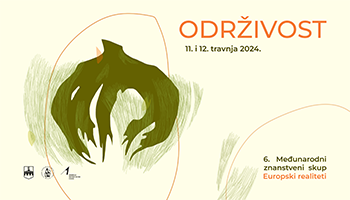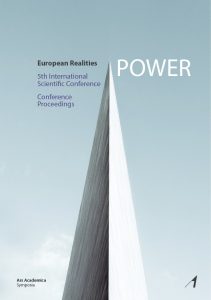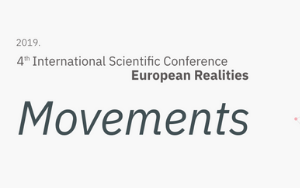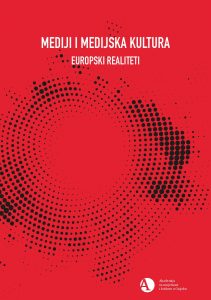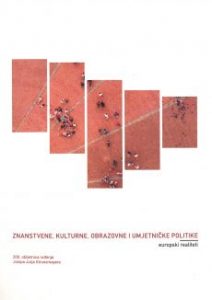Academy of Arts and Culture in Osijek
organizes and invites You
to the 6th International Scientific Conference European Realities
/SUSTAINABILITY/
(Osijek, 11 and 12 April 2024)
Co-organizers
Croatian Academy of Sciences and Arts, Center for Scientific Work in Vinkovci, Croatia
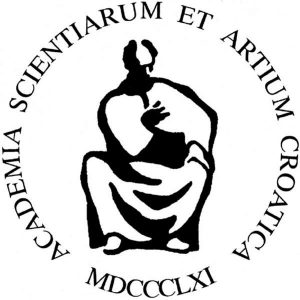
Doctoral School of J. J. Strossmayer University of Osijek

You are invited to the 6th International Scientific Conference European Realities which deals with interdisciplinary reflection and analysis of cultural, educational, artistic and scientific policies in the European context, as well as their consequences on specific aspects of contemporary social and cultural environment.
The conference with various recent themes has been taking place since 2013, first of which was devoted to the role of national identity in the context of the European Union, the second of which was held in 2015 addressed the issue of cultural, educational, artistic and scientific policies in the context of the 200th anniversary of the birth of Josip Juraj Strossmayer. The third conference, which took place in 2017, focused on contemporary media and media culture, and the fourth conference held in 2019, was related to the necessary adaptations of culture, management, creative industries, media and public communication in the general digital environment. The fifth conference in 2022, after the Covid-19 pandemic and its break, focused on power and questioned who defined, transferred and created power as well as strengthened the synergy between cultural, educational, artistic and scientific policies and public communications in the modern age and in what way.
The main theme of the conference to be held at the Academy of Arts and Culture organized by the Department of Culture, Media and Management in 2024 is SUSTAINABILITY in the multidimensional sense of the term. The concept of sustainability has evolved over time. For a long period of time, the term has been understood only in its ecological sense and therefore has been a synonym for sustainability of the environment. However , today the term of sustainability includes economic and social dimension as well.
Moreover, the sustainable development goals established by the United Nations in 2015 with the 2030 Agenda, go beyond the protection of an ecosystem and biodiversity, they incorporate much more. Therefore, for example, from the UN to the EU documents, within the concept of sustainability we address the decrease of inequality, poverty, health issues, labour, infrastructure, industry, cities and the change in media politics and communications in the sense of awareness of sustainability in all its dimensions.
In 1987, the United Nations Committee on Environment and Development defined sustainability as: “a prerequisite for development that can ensure satisfaction of the needs of the current generation without endangering the abilities of the future generations”.
Since our Department has been defined as a department of culture, media and management, the conference will consist of three thematic units: 1) cultural (social) sustainability; 2) economic (ecological) sustainability; 3) media and promotion of sustainability agenda
1. Cultural sustainability
Cultural sustainability is an idea of preserving and maintaining the world’s cultural heritage. The future generations should enjoy the same cultural experiences and traditions that we do today. However, cultural sustainability goes beyond preserving our heritage. The future generations should enjoy and learn from different cultures of the world. From traditional knowledge to indigenous perspectives, languages to art. Cultural sustainability is about keeping the cultures of the world alive and thriving. According to UNESCO (the United Nations Educational, Scientific and Cultural Organization) there are two categories of cultural sustainability; material and immaterial. Material cultural sustainability is related to the physical aspects of culture, such as buildings, artefacts, and cultural heritage sites. It also includes maintenance and preservation of these entities. Cultural resources include, but are not limited on, for example archeological findings, buildings, landscapes, objects, collections and documents. They are also an important part of our identity and contribute to our sense of place, that is rootedness. These objects, in addition to being the objects of study, care and protection, can provide economic benefit through sustainable tourism, geotourism and other economic activities. Immaterial cultural sustainability, on the other hand, focuses on non-physical aspects of culture such as language, knowledge tradition and more. This also includes the transmission of these elements from one generation to another. Both material as well as immaterial cultural aspects of sustainability are as important for maintaining cultural integrity and achieving sustainable development. Every loss of cultural heritage can have a significant social and emotional effect on a community. This can lead to a loss of social cohesion and a sense of identity. Preserving different cultures can also help promote examples of sustainable tourism and create new working places. It can also help ensure sustainable management of natural resources. Cultural sustainability is therefore essential for individuals, communities and economies.
2. Economic (ecological) sustainability
Economic sustainability can be defined as the ability of an economic system to generate lasting growth in economic indicators; ability to generate income and employment for the quality of a population. Within a territorial system, economic sustainability means the ability to produce and maintain the maximum added value within the territory by efficiently combining resources in order to improve the specificity of local products and services. However, economic sustainability is just the foundation of any of sustainability concept, where promotion and preservation of economic, human/ social capital should not come at the expense of natural (ecologic) capital. Economic capital is represented by all the things individuals have made, therefore the human/ social capital is represented by all the individuals of a society, while natural capital is represented by the natural environment and natural resources of a society. If economic development and human capital would not keep track of their sustainability in the context of natural capital (economic), to put it figuratively, they would be cutting the branch on which they are sitting. The principle of the entire development must therefore be a guarantee to the future generations based on the principle of justice, that they are not going to be defrauded whereat economic and ecological sustainability are being regarded as two sides of the same medal.
3. Media and promotion of sustainability agenda
All of this cannot happen without the involvement of citizens, various civil society actors and ever increasing segments of public opinion. Information and communication take a central place here. It is absolutely essential to promote a shared, universally understandable language to build and experiment with new ways and tools of communication, developing this way effective communication for spreading a vision of the future based on sustainability. Media, as a bloodstream of a society, is a necessary prerequisite for spreading awareness of sustainability issues and tools for implementing them, as well as for help in strengthening relationships and crating space for collaboration between institutions, for the consolidation and full functionality of governance for sustainability, with both civil society and non-state actors (the private sector) in order to encourage their active involvement into decision making processes, enforcement politics and evaluations.
This conference, therefore, questions and empowers the synergy between cultural, economic, scientific policies and public communications in the context of sustainability.
Some of the topics for discussion within the conference’s thematic areas include:
1. Cultural sustainability
- Globalization and localization. The problem of cultural homogenization
- “Cancel” culture, attitude towards tradition and the past. Erasing or learning?
- Migration and changes in demographic and cultural paradigms
- Anglicization/ Americanization and the sustainability of small languages and cultures
- The non/sustainability of multiculturalism. Cultures between conflict and encounter/dialogue
- Cultural memory and artificial intelligence
- Digital humanities, digital natives and the sustainability of traditional culture
- Identities- linguistic, gender, media, virtual
- Croatian cultural policies
- European cultural policies
- Literature, cultural heritage, cultural consumerism- development potentials
- Cultural tourism and sustainability
2. Economic (Ecological) Sustainability
- Creative economy: future and trends of sustainable development
- Anthropocentrism, animalism, biocentrism. Different approaches to ecological issues
- The European Green deal, the sustainability of the fourth industrial revolution
- Ecology between the imperative of sustainable development and ecological terrorism and fundamentalism (ideologies)
- Sustainability as social responsibility
- Sustainable development and legal regulations
- Climate anxiety as a public health issue
- Croatia and the issue of energetic, agricultural- food self-sufficiency
- Laudato sii, the first ecologic encyclical. Religions and sustainable growth
- European legal frame- green policies
- Croatian tourism, apartment building and landscape devastation
3. Media and the promotion of sustainability agenda
- Big companies and public relations. How do they communicate their contribution to green policies and sustainable and economic development
- The role of media in promoting cultural, social and economic sustainability
- Sensational/ apocalyptic media approach in reporting on climate changes. Heuristics of fear
- Environmental sustainability and awareness as significant economic factors in product branding
- Green marketing
- Contribution of popular culture to ecological, social and cultural sustainability
The listed guidelines are not mandatory. They simply indicate the diversity of possible approaches to the concept of sustainability in its multi-layerdness and multidimensionality. In this sense, the participants of the 6th International Scientific Conference European Realities- SUSTAINABILITY are invited to engage in interdisciplinary discussions on sustainable issues and the general division into three thematic areas is for orientation purposes only.
Organizers/ co-organizers
Academy of Arts and Culture in Osijek, Croatia
Croatian Academy of Science and Art
The Doctoral School of the University of Osijek
City of Osijek
Hochschule der Medien, Germany
Univerzita Sv Cyrila a Metoda Trnava, Fakulta masmediálnej komunikácie, Slovakia
Universidad Complutense Madrid, Facultad de Ciencias de la Información, Spain
Swiss School of Business and Management Geneva, Switzerland
University of Mostar, Bosnia and Herzegovina
Organizing Committee
Luka Alebić, Ph.D., president
Tatjana Ileš, Ph.D.
Marta Borić Cvenić, Ph.D.
Damir Šebo, Ph.D.
Nebojša Lujanović, Ph.D.
Igor Marvin, Ph.D.
Snježana Barić Šelmić, Ph.D., secretary
Marina Jambrešić, Ph.D.
Tomislav Marijanović
Toni Podmanicki
Marija Tolušić
Blanka Gigić, Ph.D.
Tomislav Levak
Maja Haršanji
Iris Tomić
Paula Rem
Saša Drinić
Igor Tretinjak, Ph.D.
Ana Matišić, student
Filip Jurić, student
Antonio Sečak, student
Domagoj Sabo, student
Nataša Takač, student
Scientific and Program Committee
Iva Buljubašić, associate professor, Ph.D. (president), Academy of Arts and Culture in Osijek, Croatia
Ivica Šola, professor, Ph.D Academy of Arts and Culture in Osijek, Croatia
Borko Baraban, professor, Ph.D Academy of Arts and Culture in Osijek, Croatia
Jasminka Najcer Sabljak, professor, Ph.D Academy of Arts and Culture in Osijek, Croatia
Marija Šain, professor, Ph.D Academy of Arts and Culture in Osijek, Croatia
Marina Đukić professor, Ph.D Academy of Arts and Culture in Osijek, Croatia
Martin Engstler, professor, Ph.D., Hochschule der Medien, Germany
Uwe Eisenbeis, professor, Ph.D., Hochschule der Medien, Germany
Burkard Michel, professor, Ph.D., Hochschule der Medien, Germany
Christoph Kunz, professor, Ph.D., Hochschule der Medien, Germany
Ján Višňovský, associate professor, Ph.D., Univerzita Sv Cyrila a Metoda Trnava, Fakulta masmediálnej komunikácie, Slovakia
Daniela Kollárová, associate professor, Ph.D., Univerzita Sv Cyrila a Metoda Trnava, Fakulta masmediálnej komunikácie, Slovakia
Jana Radošinská, associate professor, Ph.D., Univerzita Sv Cyrila a Metoda Trnava, Fakulta masmediálnej komunikácie, Slovakia
Andrej Brník, MSc., PhD., Univerzita Sv Cyrila a Metoda Trnava, Fakulta masmediálnej komunikácie, Slovakia
Peter Murár, MSc., PhD., Univerzita Sv Cyrila a Metoda Trnava, Fakulta masmediálnej komunikácie, Slovakia
Carmen Salgado Santamaría, professor, Universidad Complutense Madrid, Facultad de Ciencias de la Información, Spain
Mercedes Zamarra, professor, López, Universidad Complutense Madrid, Facultad de Ciencias de la Información, Spain
María José Cavadas Gormaz , professor, Universidad Complutense Madrid, Facultad de Ciencias de la Información, Spain
Miguel Ángel Ortiz Sobrino, professor, Universidad Complutense Madrid, Facultad de Ciencias de la Información, Spain
Jacinto Gómez López, professor, Universidad Complutense Madrid, Facultad de Ciencias de la Información, Spain
José Díaz Cuesta, professor, Universidad Complutense Madrid, Facultad de Ciencias de la Información, Spain
Pesús Flores Vivar, professor, Universidad Complutense Madrid, Facultad de Ciencias de la Información, Spain
Maria Inês Ribeiro Basílio de Pinho, professor, School of Education of Polytechnic of Porto (P.Porto-ESE)
Ivana Bestvina Bukvić, associate professor, Ph.D., Faculty od Economics, Croatia
Dario Silić, full professor, Ph.D., Swiss School of Business and Management Geneva, Switzerland
Zoran Tomić, professor, Ph.D., Sveučilište u Mostaru, Bosnia and Herzegovina
Sanja Bijakšić, professor, Ph.D., Sveučilište u Mostaru, Bosnia and Herzegovina
Dragan Čalović, professor, Ph.D., veučilište Privredna akademija u Novom Sadu, Fakultet suvremenih umjetnosti u Beogradu, Serbia
Milica Popović Stijačić, assistant professor, Ph.D., Sveučilište u Novom Sadu, Fakultet za medije i komunikacije, Serbia
Partners:
HAZU, City of Osijek, The Doctoral School of the University of Osijek
Projected important dates
- Deadline for submitting abstracts: 1 March 2024
- Notification of abstract acceptance: 15 March 2024
- Deadline for payment of conference fee: 15 March 2024
- Deadline for submitting full papers and providing a statement of originality and authorship: 31 October 2024
Conference fee
Conference fee – 150,00 € per paper
Students participating in The Doctoral School of the University of Osijek and AUKOS Specialized Studies (Public Relations and Communication Studies; Creative Therapies) have a 50% discount on tuition fees.
The conference fee includes participation in the conference, attendance at all events, promotional materials, refreshments during the conference, and conference proceedings. The conference fee must be paid until 15 March 2024.
Each participant as an author or co-author can present only one paper at the conference.
Please pay the conference fee to:
Academy of Arts and Culture in Osijek
P. Svačića 1f, Osijek
IBAN: HR7323600001102689236
PIN:60277424315
- With the note: conference fee for participation in the scientific conference, name and surname of the person for whom the fee is paid and personal identification number
Papers that are not submitted within the specified deadlines will not be sent to a review procedure nor published in the conference proceedings.
Conference proceedings in English will be submitted for evaluation to the databases Web of Science and EBSCO (please note that the selected texts have to meet all requirements related to academic texts in English; the highest quality of professional translation is required).
>Application form for participation in the conference European Realities 2024
>Guidelines for authors European Realities 2024
>Statement of authorship and originality of the paper
Email address for conference submissions: europskirealiteti@gmail.com
Contacts for communication:
Snježana Barić-Šelmić, Ph.D. (snjezana.baric@gmail.com)
Conference Secretary
Snježana Barić-Šelmić, Ph.D. (snjezana.baric@gmail.com)
Official languages of the conference: Croatian / English
IMPORTANT NOTES:
The conference is planned to be held in person (live).
All the registered participants will be informed in a timely manner about any possible changes, and this information will also be posted on the official website of the conference at the Academy of Arts and Culture in Osijek.
The planned dates for paper submissions and the expected deadlines for publishing the conference proceedings will not change, regardless of possible changes in the conference dates and format.
Previous Conferences and Proceedings
>>> Conference proceedings European Realities – Power 2021
>>> Conference Proceedings International Scientific Conference European Realities – Movements 2019
>>> Conference Proceedings “Mediji i medijska kultura – Europski realiteti” 2017

